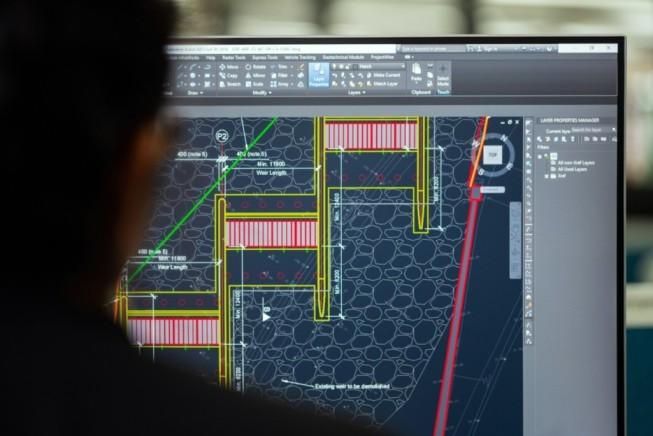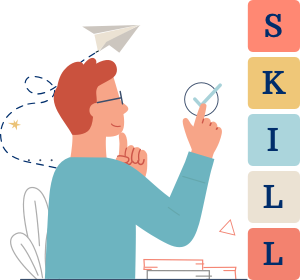50+ Best Skills to Put On CV (CV Skills Examples for 2026)
Key skills for a CV play a crucial role in effectively demonstrating your suitability for the role and significantly increasing your chances of progressing in the recruitment process. Discover a complete list of skills to put on a CV tailored to your profession.

Our customers have been hired by: *Foot Note
Too many great candidates are passed over because their CV skills section doesn’t tell the right story. Whether you’re updating your application or starting fresh, we’ll help you choose the skills to put on a CV that prove you’re the ideal fit. Our expert-backed tips and real-world skills examples will show you how to stand out in any industry.
Our intelligent CV builder ensures your CV meets the needs of the market by creating a tailored list of skills specific to your job title. Discover which CV skills employers value most in your profession and make your application stand out!
Top 10 skills for a CV
Hiring managers aren’t the only ones reviewing your CV; so are Applicant Tracking Systems (ATS). Including the right CV skills examples boosts your chances of getting noticed and passing that first digital scan.
The CV skills listed below (identified as Essential Employment Skills by NFER) are valued across nearly all roles and industries. Whether you’re aiming for a creative role or a corporate one, these CV skills will enhance your application every time you write a CV.
Communication skills – Clear, confident communication is vital in almost every role. This includes written communication (like emails and reports) and verbal skills (such as presenting or giving feedback). It shows you can articulate ideas, collaborate effectively, and build trust.
Interpersonal skills – Also known as “people skills,” interpersonal abilities help you build relationships and work well in a team. Employers appreciate candidates who can listen, empathise, and resolve conflicts smoothly.
Problem-solving – Problem solvers are resourceful, analytical, and calm under pressure. Highlight how you’ve tackled challenges, made decisions, or introduced improvements to show you’re capable of navigating complex situations.
Time management – Being able to organise your schedule, juggle priorities, and meet deadlines tells employers you’re dependable and productive, even when things get busy.
Adaptability – The workplace changes fast. Whether it’s learning new tools or adjusting to a hybrid setup, adaptability signals that you’re flexible, open to growth, and can handle the unexpected.
Digital literacy – From mastering basic productivity tools to navigating more advanced systems or platforms, digital literacy is one of the most in-demand hard skills. It shows you’re equipped to thrive in a tech-driven workplace.
Teamwork – Employers want team players; people who can collaborate, support others, and contribute to shared goals.
Leadership – Leadership skills aren’t just for managers. It’s about taking initiative, mentoring others, and guiding projects to success. If you’ve led a team, chaired a meeting, or coached a colleague, it counts.
Creative thinking – Problem-solving’s more colourful cousin, creative thinking, is all about generating ideas, rethinking systems, and finding fresh solutions. It’s a particularly strong skill to highlight in marketing, design, innovation, and strategy roles.
Analytical skills – These hard skills show you can assess data, spot trends, and make informed decisions. Particularly prized in business, finance, and tech roles, they’re also relevant in day-to-day problem-solving.
These 10 key skills for CVs demonstrate to employers that you are adaptable, collaborative, and versatile. See what else to include in a CV!
Hard skills vs. soft skills
When writing your job application, it’s important to highlight a mix of hard and soft skills to show that you’re a well-rounded candidate. Let’s start by looking at what these two types of CV skills actually mean.
Hard CV skills are your trained abilities—the practical tools you’ve gained through study, practice, and experience. These are the things you can test, teach, and track. From software to certifications, hard skills prove that you can hit the ground running. These skills match you to the job. And in the era of applicant tracking systems (ATS), they also help your CV get past the bots and into human hands.
Soft CV skills, Soft skills are your human skills—the ones that help you collaborate, lead, adapt, and communicate. Think of them as the traits that shape your relationships and responses on the job. Whether you’re calming a client, juggling priorities, or supporting your team during a crunch, these are the qualities that keep the wheels turning. Employers want people they can trust to handle change, navigate feedback, and make others around them better. Soft skills are often what tip the scales between a good candidate and a great hire.
The best CVs blend soft skills with hard skills. A candidate who can crunch numbers and work well in team scenarios is far more valuable than someone who can only do one.
Hard skills examples for your profession
When adding hard skills to your CV, think of them as proof of what you can do. These are the measurable, technical abilities you’ve gained through training, certifications, or on-the-job experience. They show employers you’re qualified to handle specific tasks, and they’re often what recruiters will scan for.
You will usually put hard skills in these three sections of your CV:
- Skills section: Briefly list 3-5 relevant hard skills.
- Work experience section: Describe your duties and responsibilities using bullet points to show how you applied these important skills. For example, if you’re an accountant, one task might be “Prepared periodic reports comparing budgeted and actual costs”.
- Personal statement: Include 1–2 standout hard skills that are essential for the job. This reinforces your technical strengths right at the top.
Top hard CV skills for graphic designers
- Proficiency in design software (e.g., Adobe Creative Suite)
- Specific IT skills like User Interface (UI) and User Experience (UX) Design
- Typography and layout design
- Digital illustration
- Knowledge of web design standards and HTML/CSS basics
Related job guides with skills list:
Top hard skills for retail jobs
- Point of Sale (POS) system operation
- Inventory management
- Merchandising and product display
- Sales techniques and upselling
- Cash handling and transaction processing
Related job guides with skills list:
Top hard CV skills for law jobs
- Legal research and analysis
- Contract drafting and negotiation
- Litigation and case management
- Understanding of legal compliance and regulations
- Courtroom procedure and advocacy
Related job guides with skills list:
Top hard skills for HR professionals
- Talent acquisition and recruitment
- Employee relations and conflict resolution
- Computer skills and HR software proficiency (e.g., SAP, Oracle)
- Compensation and benefits administration
- Performance management and appraisal
Related job guides with skills list:
Top hard skills for accounting jobs
- Financial reporting and analysis
- Tax preparation and compliance
- Proficiency in accounting software (e.g., QuickBooks, SAP, Excel)
- Budgeting and forecasting
- Auditing and internal controls
Related job guides with skills list:
Top hard skills for customer service jobs
- Technical know-how, including CRM software proficiency (e.g., Salesforce)
- Active listening and effective communication
- Customer service skills, including issue resolution and conflict management
- Product knowledge and training
- Data entry and documentation accuracy
Related job guides with skills list:
Top soft skills for CVs
Soft skills are the human strengths that help you thrive in the workplace. Unlike hard skills, they’re not tied to specific tasks or tools. Instead, they show how you interact with others, solve problems, manage your time, and adapt to change. These transferable abilities are highly valued across all industries, particularly in roles involving teamwork, communication, leadership, or customer service.
You will usually add soft skills in the same three CV sections:
- Personal statement: A good place to mention the most relevant soft skills found in the job ad.
- Skills section: Supplement your job-specific skills with 2-3 relevant soft skills.
- Work experience: Use bullet points to show how you used these top skills, e.g. as a nurse, “established a positive rapport with patients and families through active listening and compassionate care”.
Soft CV skills for Engineers
Related job guides with skills list:
Soft CV skills for managers
Related job guides with skills list:
Soft CV skills for analysts
Related job guides with skills list:
Soft CV skills for project management roles
Related job guides with skills list:
Soft CV skills for creative jobs
Related job guides with skills list:
FAQ: Common questions about CV skills
What are good skills to put on a CV?
Good skills for a CV are those that match the needs of the job you’re applying for. The most effective CVs combine technical abilities with interpersonal strengths, showing not just what you can do, but how you work. Think about what the employer values most, then highlight those qualities throughout your CV.
What is a skills-based CV?
A skills-based CV, also known as a functional CV format, focuses on highlighting your skills and competencies rather than your work history. It is ideal for candidates with gaps in employment, career changers, or those with a wide range of skills from different roles.
Unlike a traditional reverse-chronological CV, a skills-based CV includes a more detailed skills section prominently placed after your personal statement or professional summary. This format allows you to highlight your skills and demonstrate how they match job requirements, even if your work experience is less relevant or consistent.
What are hard skills for CV?
Hard skills are measurable, job-specific abilities you’ve gained through training, education, or experience. These include things like data analysis, coding, bookkeeping, or operating machinery. Always add hard skills to your CV that match the job ad, as they show your technical proficiency.
What are soft skills for CV?
Soft skills are personal attributes and interpersonal abilities that help you work well with others and adapt to different situations. Unlike hard skills, they’re harder to measure, but just as important. Add soft skills to your CV that align with the role, as they show how you’ll contribute to the company culture.
How many skills should you include on a CV?
You should include around 6–10 carefully selected skills on your CV, depending on your experience and the role you’re applying for. Use a balanced mix of both hard and soft skills that are directly relevant to the job. It’s also a great idea to support your CV skills with short accomplishments or examples to add context and credibility.
Where do you list skills on a CV?
Skills usually appear in four main CV sections:
- Skills section: A quick list of your top hard and soft skills.
- Work experience: Show how you applied skills with examples and results.
- Personal statement: Highlight 2–3 core strengths up front.
- Education section: Mention relevant skills gained through coursework or projects.
Depending on your extracurricular activities, you can also showcase skills in your bonus sections.
What are the most in-demand CV skills right now?
The most in-demand CV skills in 2026 include:
- Digital literacy and proficiency with tools like Excel, CRM systems, and AI-assisted platforms
- Project management and organisational skills
- Adaptability and resilience
- Teamwork, especially in hybrid or remote settings
- Communication across digital channels
How do I describe my skills with no work experience?
Even without work experience, you can show your skills through education, volunteering, personal projects, or extracurricular activities. Focus on transferable skills like teamwork, problem-solving, or time management. Use specific examples, like group assignments or student leadership roles, to show how you’ve applied these skills.
Key takeaways about CV skills
- Balance hard and soft skills. A strong CV should have a mix of hard and soft skills tailored to the job you’re applying for, demonstrating both technical and interpersonal skills.
- Tailor your skills to the job. Carefully review the job description and highlight skills that match the employer’s needs to make your CV more relevant and attractive.
- Use examples to demonstrate skills. In your work experience section, provide concrete examples of how you used your skills to achieve specific results.
- Use skills for different roles. Highlight skills relevant to the industry or profession to show how your skills align with specific job requirements.
- Include a tailored cover letter. Pair your CV with a cover letter that expands on your skills and accomplishments to make a strong, detailed case for your candidacy.
*The names and logos of the companies referred to above are all trademarks of their respective holders. Unless specifically stated otherwise, such references are not intended to imply any affiliation or association with myperfectCV.
























